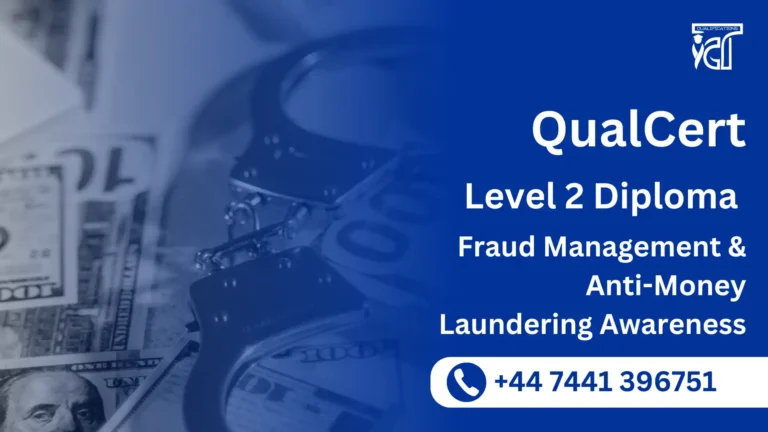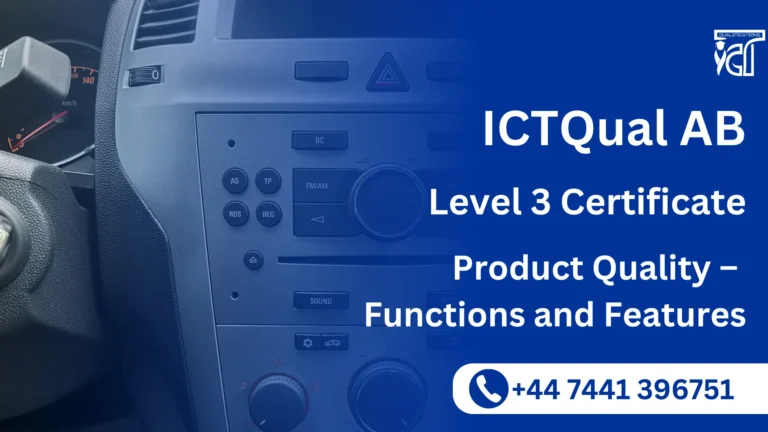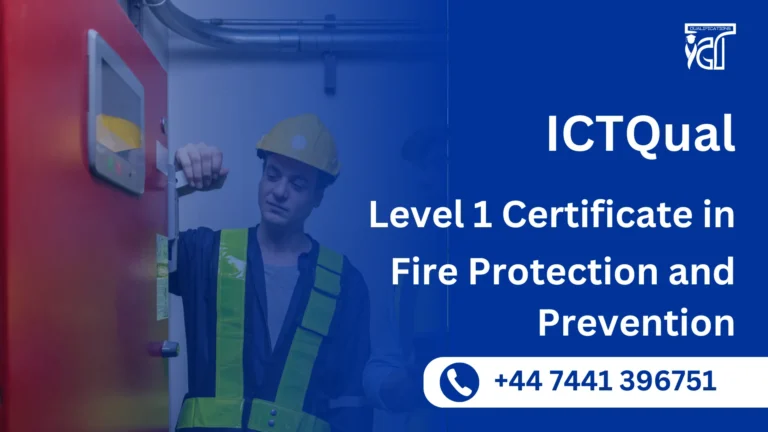In today’s world, fire protection and prevention are critical components of workplace safety and emergency preparedness. The ICTQual Level 2 Certificate in Fire Protection and Prevention is designed to provide individuals with the fundamental knowledge and practical skills needed to understand and manage fire risks effectively. Whether you’re new to the fire safety industry or looking to expand your skillset, this Ofqual-regulated qualification offers a solid foundation in fire safety, ensuring you meet industry standards for risk management and protection.
The ICTQual Level 2 Certificate in Fire Protection and Prevention is a qualification aimed at individuals seeking to build their expertise in fire safety management. This entry-level course is perfect for those who wish to pursue a career in fire protection or enhance their existing role in safety, facilities management, or emergency response.
As an Ofqual-regulated qualification, this certification is recognized by employers and regulatory bodies worldwide, ensuring you receive a high-quality education in fire safety that is both practical and compliant with relevant fire safety regulations.
The ICTQual Level 2 Certificate is designed to help learners understand fire safety principles and the steps required to reduce fire risks in various environments. This qualification provides essential knowledge for identifying fire hazards, understanding fire behavior, and learning how to prevent and respond to fire emergencies.
The ICTQual Level 2 Certificate in Fire Protection and Prevention provides individuals with the essential knowledge and skills needed to enhance safety and fire protection in a wide range of industries. As an Ofqual-regulated, assignment-based qualification, this certification ensures learners receive high-quality training without the pressure of exams. By completing this course, you will be equipped to make a real difference in fire safety, both in your professional environment and your community.
Get started today and take the first step toward becoming a certified fire safety professional.
ICTQual Level 2 Certificate in Fire Protection and Prevention
This qualification, the ICTQual Level 2 Certificate in Fire Protection and Prevention, consists of 6 mandatory units.
- Understanding Fire Chemistry and Behaviour
- Fire Risk Assessment and Hazard Control
- Active and Passive Fire Protection Systems
- Fire Emergency Planning and Response Strategies
- Fire Safety Laws, Standards, and Compliance
- Fire Safety Audits and Inspection Techniques
GLH (Guided Learning Hours) and TQT (Total Qualification Time) are terms commonly used in vocational qualifications to help define the amount of time a learner is expected to spend on their studies.
1. GLH (Guided Learning Hours)
GLH refers to the number of hours a learner spends being directly taught, supervised, or supported during their course. This includes the time spent in activities such as:
- Classroom instruction
- Practical workshops
- One-on-one tutoring or mentoring sessions
- Online learning sessions with tutor support
In other words, GLH represents the time that learners are actively engaged with their instructors or learning activities.
2. TQT (Total Qualification Time)
TQT represents the total amount of time a learner is expected to invest in completing a qualification, including:
- GLH (Guided Learning Hours): Time spent on direct learning, as explained above.
- Self-Directed Learning: This includes time spent on independent study, research, assignment completion, preparation for exams, and any other work the learner does outside of direct teaching hours.
TQT is a broader measure that includes all the time required to achieve the qualification. It helps learners and employers understand the overall commitment required for the qualification.
Key Differences Between GLH and TQT:
- GLH focuses on direct learning with guidance or supervision.
- TQT includes GLH as well as independent study time and other learning-related activities.
Example:
If a qualification has a TQT of 600 hours and a GLH of 250 hours, it means the learner should spend 250 hours in direct learning (classroom, online, or tutor-led sessions) and 350 hours on independent study or research.
Here are the learning outcomes for each study unit:
Understanding Fire Chemistry and Behaviour
- Learn the fundamental science behind fire behaviour.
- Understand how fire spreads and the conditions that affect fire development.
Fire Risk Assessment and Hazard Control
- Develop skills to identify and assess fire risks.
- Learn different hazard control strategies for fire prevention.
Active and Passive Fire Protection Systems
- Understand the difference between active and passive fire protection.
- Learn how fire protection systems help in fire prevention and suppression.
Fire Emergency Planning and Response Strategies
- Develop comprehensive fire emergency response plans.
- Learn about different fire response strategies in workplace settings.
Fire Safety Laws, Standards, and Compliance
- Gain in-depth knowledge of fire safety laws and compliance requirements.
- Understand how fire safety standards affect workplace safety procedures.
Fire Safety Audits and Inspection Techniques
- Learn how to conduct fire safety audits and workplace inspections.
- Develop skills for documenting fire safety compliance.
Course Benefits
The ICTQual Level 2 Certificate in Fire Protection and Prevention offers numerous benefits for individuals and organizations looking to improve fire safety standards and risk management. This qualification provides foundational knowledge that is applicable across various industries and environments. Below are some key benefits of completing this course:
- Globally Recognized and Ofqual Regulated
The course is Ofqual-regulated, meaning it adheres to strict national and international standards. This recognition ensures that the qualification is accepted by employers and regulatory bodies worldwide. - Practical Fire Safety Skills
Gain essential, hands-on knowledge of fire prevention, risk assessment, fire protection systems, and emergency preparedness. These practical skills are directly applicable in real-world scenarios, enhancing your ability to contribute to safer environments. - No Exams – Assignment-Based Assessment
The qualification is assessed through assignments, not exams, allowing you to demonstrate your understanding through practical application. This reduces exam-related stress and provides an opportunity for deeper learning and engagement with the course material. - Career Enhancement and Development
Whether you’re starting a career in fire safety or seeking to specialize within your existing role, this qualification boosts your professional standing and opens up new career opportunities in fire safety management, health and safety, and facility management. - Flexibility and Accessibility
With online learning options and flexible study schedules, this course is accessible to anyone, regardless of location or work schedule. You can study at your own pace, making it easier to balance work, study, and personal commitments. - Compliance with Fire Safety Legislation
The course provides essential knowledge of fire safety laws and regulations, ensuring that learners are well-equipped to meet legal obligations related to fire safety in the workplace. This helps reduce risks of non-compliance and enhances safety protocols. - Improved Workplace Safety
Completing this certification allows you to identify fire hazards, implement control measures, and develop effective fire protection strategies. This ultimately contributes to a safer work environment and reduces the likelihood of fire-related accidents and incidents. - Pathway to Advanced Qualifications
After completing the Level 2 Certificate, you can continue your learning journey with more advanced fire safety qualifications, such as the ICTQual Level 3 Certificate in Fire Protection and Prevention, to further specialize and expand your career prospects. - Cost-Effective
This qualification offers excellent value for money, as it provides essential fire safety knowledge without the need for costly exams or extensive training. It’s a practical and cost-effective way to enhance your qualifications and improve your skillset. - Employer Benefits
Organizations benefit from investing in employees who hold this qualification, as it improves safety standards, supports compliance with fire safety regulations, and reduces the risk of fire-related incidents. It also fosters a culture of safety within the workplace.
The ICTQual Level 2 Certificate in Fire Protection and Prevention is an ideal choice for individuals and organizations looking to develop or enhance their fire safety skills. Whether you’re just starting out in the industry or seeking to formalize your knowledge, this certification offers a strong foundation for ensuring safer working environments.
Who Is the Best Fit for the ICTQual Level 2 Certificate in Fire Protection and Prevention?
The ICTQual Level 2 Certificate in Fire Protection and Prevention is designed for individuals looking to develop foundational knowledge in fire safety and prevention. This qualification is suitable for a wide range of professionals across various industries who are seeking to enhance their fire protection expertise. The best fit for this course includes:
- Health and Safety Professionals
Those already working in health and safety roles will benefit from gaining a comprehensive understanding of fire safety, enabling them to apply more specific fire prevention measures in their daily work. - Facilities Managers and Building Supervisors
Individuals responsible for managing buildings and facilities will gain critical fire safety knowledge, allowing them to oversee and enforce fire safety measures, ensuring that their premises comply with regulations and are safer for occupants. - Construction Site Managers and Supervisors
Fire hazards on construction sites are significant, and this course equips construction managers with the skills to prevent fire risks, implement effective control measures, and create fire emergency plans to keep workers safe. - Maintenance Workers and Technicians
Technicians who maintain safety equipment, such as fire alarms, extinguishers, and sprinklers, will benefit from this qualification by deepening their understanding of how these systems work and how to maintain them properly to ensure functionality during an emergency. - Fire Safety Wardens or Officers
Employees assigned to fire safety roles in the workplace will benefit from formal training in identifying fire hazards, conducting risk assessments, and managing fire protection systems, all of which will enhance their ability to prevent and respond to fire incidents. - Individuals New to Fire Safety
For those new to the field of fire safety, this qualification provides an accessible entry point. It helps individuals understand the basic principles of fire prevention, fire behavior, and safety systems, providing the necessary foundation for further training or career development in fire safety. - General Workers in Fire-Prone Environments
Employees working in industries or environments where fire safety is a concern—such as hospitality, education, healthcare, or warehousing—will benefit from knowing how to spot fire risks and what steps to take in case of an emergency. - Anyone Interested in Pursuing a Career in Fire Safety
Whether you’re looking to enter the fire protection and prevention industry or want to specialize in health and safety, this certification is the perfect starting point for building your knowledge and advancing your career in fire safety.
In short, the ICTQual Level 2 Certificate in Fire Protection and Prevention is ideal for professionals across a wide range of sectors, from facilities management and construction to fire safety and general health and safety. It provides essential fire safety knowledge for those looking to ensure safer environments and reduce fire risks in the workplace.
Entry Requirements
Register Now
Qualification Process
Qualification Process for the ICTQual Level 2 Certificate in Fire Protection and Prevention
- Self-Assessment:
Begin by evaluating your eligibility to ensure you meet the qualification requirements, including work experience, knowledge, and language proficiency. - Registration:
Complete your registration by submitting the required documents, including a scanned copy of a valid ID, and paying the registration fee. - Induction:
An assessor will conduct an induction to confirm your eligibility for the course and explain the evidence requirements. If you do not meet the criteria, your registration will be canceled, and the fee will be refunded. - Assignmnets & Evidence Submission:
Provide all assignmnets and the necessary evidence based on the assessment criteria outlined in the course. If you are unsure of the required evidence, consult with the assessor for guidance on the type and nature of evidence needed. - Feedback and Revision:
The assessor will review your submitted evidence and provide feedback. Evidence that meets the criteria will be marked as “Criteria Met,” while any gaps will be identified. You will be asked to revise and resubmit if needed. - Competence Evidence:
Submit final evidence demonstrating that all learning outcomes have been met. This evidence will be marked as “Criteria Met” by the assessor once it is satisfactory. - Internal Quality Assurance (IQA):
The Internal Quality Assurance Verifier (IQA) will review your evidence to ensure consistency, quality, and compliance with standards. - External Verification:
The IQA will submit your portfolio to ICTQUAL AB External Quality Assurance Verifiers (EQA) for final confirmation. The EQA may contact you directly to verify the authenticity of your evidence. - Certification:
Upon successful completion of all checks, ICTQUAL AB will issue your official certificate, confirming that you have attained the ICTQual Level 2 Certificate in Fire Protection and Prevention.







